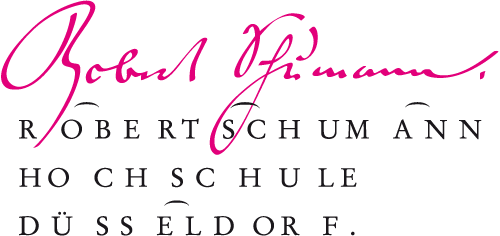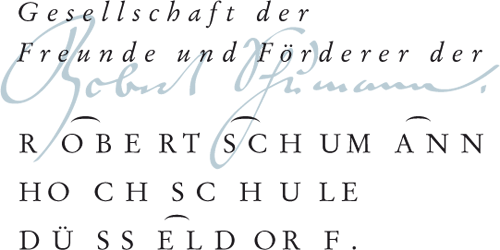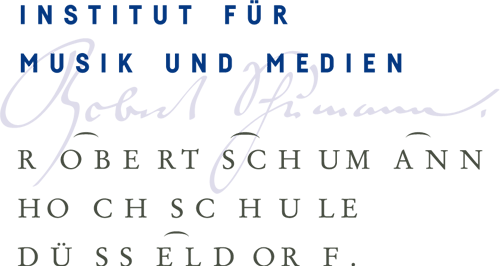Institute of Church Music
The image of the church music profession has changed substantially. Pedagogical skills are becoming more and more important. For this reason, the interrelated modular structure of the bachelor’s program in Church Music is designed to combine high artistic qualifications with instruction reflecting current practices.
The Institute of Church Music has its own library, a large number of teaching and rehearsal rooms with appropriate instruments and a student residence. The Institute maintains close contact with potential employers of graduates, the specialized committees of the Archdiocese of Cologne and the Diocese of Essen, as well as the Protestant state church in the Rhineland.
What programs of studies are there and what degrees can be obtained?
Through the Institute of Church Music at the Robert Schumann Hochschule Düsseldorf offers bachelor’s and master’s programs in accordance with the professional programs in Protestant and Catholic church music which lead to a Bachelor of Music (normal duration of studies 8 semesters) or a Master of Music (normal duration of studies 4 semesters). The extensive offering of the university includes a wide range of programs in church music in, among others, Organ (BM/MA/Music Performance) and Choral Conducting (BM/MA).
How many students are there and how many instructors teach them?
In the summer semester of 2018 there were 22 young musicians (8 Lutheran/14 Catholic) studying Church Music and 5 enrolled in Organ Performance. Classes in the core performance subjects of organ literature/liturgical organ playing are taught by 4 teachers (2 professorships). There are currently 6 teachers working in the areas of choral conducting/orchestral conducting/directing chant singing (3 professorships).
The church-specific subjects of the program are taught by sessional lecturers, who are usually church professionals. All other areas of the program are taught by cross-major teachers on the staff of the university, among others teachers from the Institute of Composition and Music Theory and the Institute of Musicology.
What are the specialized aspects of the study program?
In a closely networked program structure, the university attaches great importance to ensuring that training is oriented to later professional practice, and removes individual subject matter from its isolation and places it in a holistic context. Thus, for example, the contents of popular music are connected in a natural way with the contents of the instruction in the subjects organ performance or choral conducting. This is also reflected in the performance projects of the institute. It is notable that an endowed professorship for choral pedagogy was established by the Archdiocese of Cologne to support training at the Institute of Church Music. Attractive elective coursework during the program of study is made possible by cooperation with the Music Pedagogy Department, the Institute of Music and Media and other areas of the University.
The master's program can be studied in three areas of focus, which nevertheless reflect the entire spectrum of study in church music with different contextual weighting: Focus on instrumental, vocal/ensemble or promotion/outreach of church music.
What role does ecumenism play in the program?
At the Institute of Church Music students of different denominations are mainly taught together. In a few areas there are denomination-specific requirements which are then taught separately. However, students are beginning to show a greater interest in attending courses outside their own religious confession. Here and in the joint celebration of the church services ecumenism as an active daily practice can be felt within the institute.
What facilities are available?
The Institute of Church Music has its own institute building with an attached student residence operated by the Protestant church, and an integrated building for rehearsing/practicing. This makes outstanding infrastructure available for teaching as well as self-study.
What instruments does the university have?
The following instruments are currently available for instrumental instruction or exams in the organ major in cooperation with the churches: The Karl Schuke organ of the Melanchthon church in the institute building (IV/ped./50 stops), the Göckel organ in St. Peter (III/ped./57 stops), the Rieger organ in St. Margareta (III/Ped./40). In addition, the University has access to instruments by the organ builders Albiez (III/Ped), Grenzing (II/Ped), Beckerath (II/Ped), Mayer (2 new instruments III/Ped), two historically significant instruments (South German Baroque organ/Italian Renaissance organ) as well as a whole number of other smaller instruments for various purposes. Since 2019 the Robert Schumann Conservatory has an own large concert and instruction organ constructed by the Rieger organ building company. The instrument is located in the Albertus Magnus church nearby the conservatory. In addition, if required, the university's extensive range of instruments is available.
Which ensembles exist?
Ensembles include the chamber choir of the Institute of Church Music, the oratorio choir of the university with an annual oratorio project in the winter semester, the university’s professional vocal ensemble, the university choir, the university orchestra, the opera ensemble and several chamber music ensembles. In addition, there is close cooperation with the amateur choirs of the Düsseldorf region (children's, youth and adult choirs) as well as with the Essen and Würzburg cathedral musicians.
The Institute of Church Music has its own library, a large number of teaching and rehearsal rooms with appropriate instruments and a student residence. The Institute maintains close contact with potential employers of graduates, the specialized committees of the Archdiocese of Cologne and the Diocese of Essen, as well as the Protestant state church in the Rhineland.
What programs of studies are there and what degrees can be obtained?
Through the Institute of Church Music at the Robert Schumann Hochschule Düsseldorf offers bachelor’s and master’s programs in accordance with the professional programs in Protestant and Catholic church music which lead to a Bachelor of Music (normal duration of studies 8 semesters) or a Master of Music (normal duration of studies 4 semesters). The extensive offering of the university includes a wide range of programs in church music in, among others, Organ (BM/MA/Music Performance) and Choral Conducting (BM/MA).
How many students are there and how many instructors teach them?
In the summer semester of 2018 there were 22 young musicians (8 Lutheran/14 Catholic) studying Church Music and 5 enrolled in Organ Performance. Classes in the core performance subjects of organ literature/liturgical organ playing are taught by 4 teachers (2 professorships). There are currently 6 teachers working in the areas of choral conducting/orchestral conducting/directing chant singing (3 professorships).
The church-specific subjects of the program are taught by sessional lecturers, who are usually church professionals. All other areas of the program are taught by cross-major teachers on the staff of the university, among others teachers from the Institute of Composition and Music Theory and the Institute of Musicology.
What are the specialized aspects of the study program?
In a closely networked program structure, the university attaches great importance to ensuring that training is oriented to later professional practice, and removes individual subject matter from its isolation and places it in a holistic context. Thus, for example, the contents of popular music are connected in a natural way with the contents of the instruction in the subjects organ performance or choral conducting. This is also reflected in the performance projects of the institute. It is notable that an endowed professorship for choral pedagogy was established by the Archdiocese of Cologne to support training at the Institute of Church Music. Attractive elective coursework during the program of study is made possible by cooperation with the Music Pedagogy Department, the Institute of Music and Media and other areas of the University.
The master's program can be studied in three areas of focus, which nevertheless reflect the entire spectrum of study in church music with different contextual weighting: Focus on instrumental, vocal/ensemble or promotion/outreach of church music.
What role does ecumenism play in the program?
At the Institute of Church Music students of different denominations are mainly taught together. In a few areas there are denomination-specific requirements which are then taught separately. However, students are beginning to show a greater interest in attending courses outside their own religious confession. Here and in the joint celebration of the church services ecumenism as an active daily practice can be felt within the institute.
What facilities are available?
The Institute of Church Music has its own institute building with an attached student residence operated by the Protestant church, and an integrated building for rehearsing/practicing. This makes outstanding infrastructure available for teaching as well as self-study.
What instruments does the university have?
The following instruments are currently available for instrumental instruction or exams in the organ major in cooperation with the churches: The Karl Schuke organ of the Melanchthon church in the institute building (IV/ped./50 stops), the Göckel organ in St. Peter (III/ped./57 stops), the Rieger organ in St. Margareta (III/Ped./40). In addition, the University has access to instruments by the organ builders Albiez (III/Ped), Grenzing (II/Ped), Beckerath (II/Ped), Mayer (2 new instruments III/Ped), two historically significant instruments (South German Baroque organ/Italian Renaissance organ) as well as a whole number of other smaller instruments for various purposes. Since 2019 the Robert Schumann Conservatory has an own large concert and instruction organ constructed by the Rieger organ building company. The instrument is located in the Albertus Magnus church nearby the conservatory. In addition, if required, the university's extensive range of instruments is available.
Which ensembles exist?
Ensembles include the chamber choir of the Institute of Church Music, the oratorio choir of the university with an annual oratorio project in the winter semester, the university’s professional vocal ensemble, the university choir, the university orchestra, the opera ensemble and several chamber music ensembles. In addition, there is close cooperation with the amateur choirs of the Düsseldorf region (children's, youth and adult choirs) as well as with the Essen and Würzburg cathedral musicians.
Robert Schumann Hochschule Düsseldorf Fischerstraße 110, 40476 Düsseldorf
Fon: +49.211.49 18 -0 www.rsh-duesseldorf.de
Fon: +49.211.49 18 -0 www.rsh-duesseldorf.de


